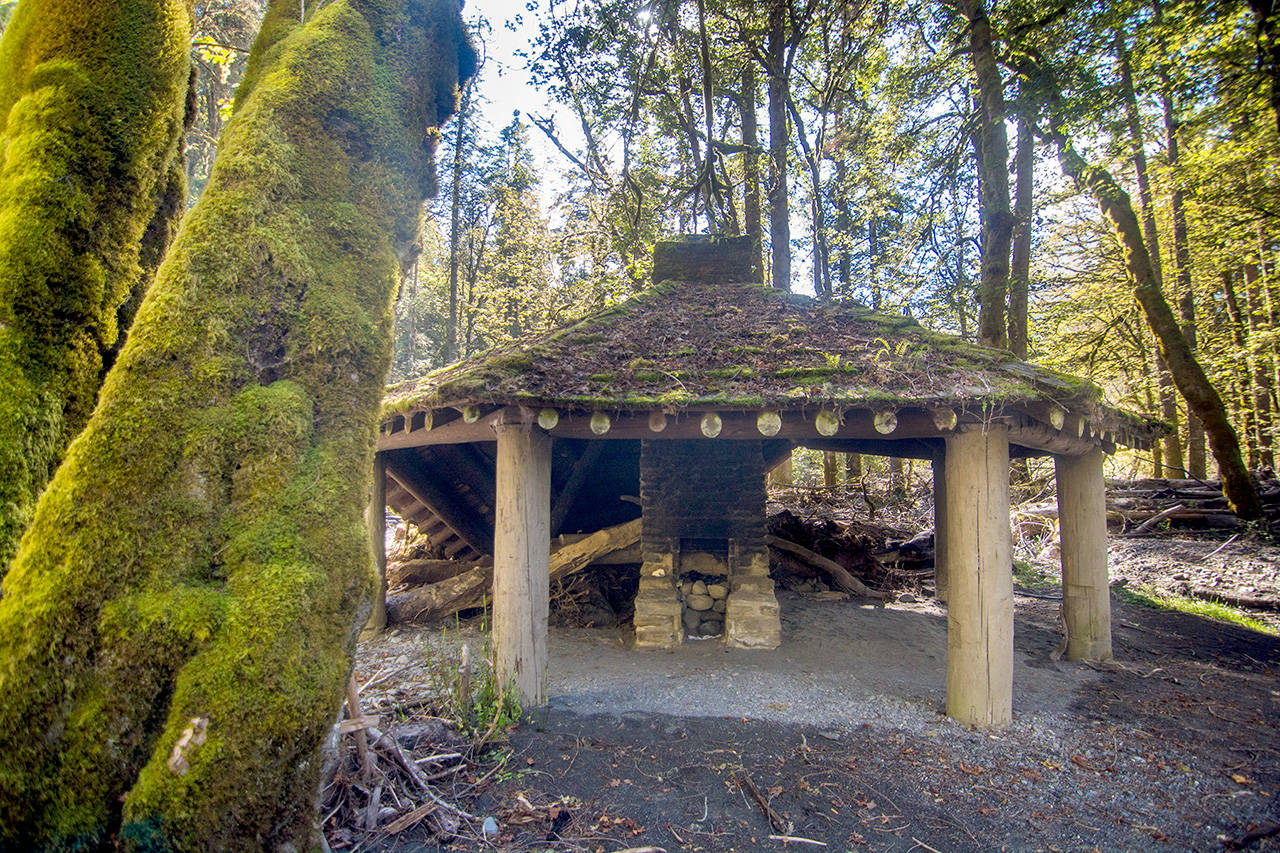OLYMPIC NATIONAL PARK — In what used to be the Elwha Campground adjacent to the flood-ravaged Olympic Hot Springs Road is a historic community kitchen that is now threatened by the wild Elwha River.
The river, which has carved its way through the road and through the campground, already has damaged the gazebo. The roof caved in on one side after the swollen river pushed wooded debris into the structure in fall 2017.
With the potential for more storms this fall and winter, Ed Bowen and several others would like to see the structure salvaged and put into storage until it the park develops a long-term solution for access to the Elwha Valley.
“The crown jewel of the cultural interest for that area is that kitchen,” Bowen said. “It’s a piece of history.”
He fears the kitchen will not survive another round of storms.
The kitchen was listed on the National Register of Historic Places in 2007 and is also listed with the state Department of Archaeology and Historic Preservation.
It’s an open-air shelter with an octagonal hip roof. The wood-shaked roof is supported by peeled logs set on a concrete foundation. It boasts a central fireplace with a chimney built of stone set in mortar.
The structure, constructed by the Civilian Conservation Corps in 1935, has been a place where families have gathered for decades.
It and a similar community kitchen in the Altair Day Use area — formerly a campground before the river destroyed it — are the only structures like that in Olympic National Park.
The park has consulted with the State Historic Preservation Office and is in the process of drafting a memorandum of agreement for the structure, said Penny Wagner, park spokesperson.
The park also is conducting a Historic American Buildings Survey for the structure that follows the Secretary of the Interior’s standards and guidelines for architectural and engineering documentation.
Wagner said the park will not take action to remove the structure without a signed memorandum of agreement with the State Historic Preservation Office.
The damaged building is just one of the issues facing the Elwha Valley.
The park has been fighting to maintain visitor access to the Elwha River since the freed river began to meander through its floodplain after the National Park Service’s $325 million effort to restore the Elwha River to its natural state with the removal of the Elwha and Glines Canyon dams.
The river, freed from the two dams since 2014, has washed out the road through the Elwha Valley repeatedly.
The park is preparing to do geotechnical testing to determine whether it is feasible to move the road to higher ground at the area of the Elwha Campground.
Bowen is concerned about the timeline, questioning when it would be possible to remove the kitchen structure. The park plans to remove the temporary bridge that provides vehicle access to the former Elwha Campground in mid- to late-October.
Bowen has been in contact with several people at Olympic National Park in hopes of finding a solution. He said he recognizes that the park is understaffed and that officials are working on several other projects already.
He thinks it is possible to move the structure if the park is willing.
Wagner said the park is committed to preserving historic structures in the Elwha Valley.
This year the park has spent about $1.12 million in the valley. About $1 million was spent on structural stabilization and re-roofing in the Elwha Historic District and about $120,000 to rehabilitate the Hayes Ranger Station.
In 2017, the park spent about $165,000 to rehabilitate the Dodger Point Lookout and to re-roof historic structures.
In 2016, the park spent $195,000 to rehabilitate the Elwha Ranger Station and about $110,000 to rehabilitate the Elkhorn Ranger Station.
Bowen is concerned that without access to the structure, it will be difficult to remove it before the river floods again.
Bowen said he and several others are willing to do the labor required to move the structure, which he said may involve disassembling it to be reassembled later.
“As a citizen, is there a means and a willingness to do this?” he asked. “We can get the means.”
Despite the caved roof, Bowen said the kitchen is actually in “great shape.”
As far as he is aware, none of the wood has rotted, despite having the river flow through the building.
“That just tells it all,” he said. “It survived the flood action, but something else [debris] intervened.”
In 2013, before the river damaged the road, nearly 70,000 vehicles traveled into the Elwha Valley.
Bowen said he hears from tourists who are visiting the Elwha Valley for the first time who ask what is being done with the caved-in kitchen in the former Elwha Campground.
He doesn’t have an answer.
“All we can say is nothing that we’re aware of,” he said. “Now that one side is caved in, they are seeing it and they can experience the problem.”
________
Reporter Jesse Major can be reached at 360-452-2345, ext. 56250, or at jmajor@peninsuladailynews.com.

